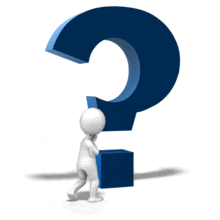Shabbat Table Talk from the desk of Rabbi Alexander Seinfeld
Here's a follow-up to last week's Moral Compass question...
Ask at the table: In the Passover story, what's the part about the blood?
To refresh your memory: the Israelites are commanded to take a sheep, slaughter it, and paint some of its blood on the doorposts and lintel of their homes.
The sheep, you may recall, was a sacred animal to Egypt. Slaughtering it and putting its blood anywhere would have been a tremendous symbolic act.
It would be akin to a modern-day Moses telling the Jews of America to burn an American flag on their lawn. (Or pick a country and its flag.)
In the merit of this mitzvah, they would be spared suffering Plague #10 - the Death of the Firstborn.
They dutifully do so, and at precisely midnight every first-born in Egypt dies, but the Israelite first-borns are spared.
This blow is so severe that Pharaoh and his people finally tell the Jews, "OK, please go now! And good riddance!"
There are many questions we could ask about this episode. Here's one that always interested me: On which side of the doorpost did they put the blood? Inside or outside?
But how does it impact the symbolism if the blood is on the inside or the outside?
Typically, the Midrash contains both opinions.
Is it possible that they're both true? That some Jews who were afraid of offending their neighbors kept the whole ritual on the inside, while the more bold put it on the outside?
Question for your table - What about you? If you had to burn your country's flag on your lawn, would you burn it on the front lawn or the back lawn? Are you an Inny or an Outty?
Shabbat Shalom
PS - For the record I'm not advocating flag-burning! It's a thought experiment. No flags were burnt in the writing of this email.
Appreciated this Table Talk? Like it, tweet it, forward it....
Ask at the table: In the Passover story, what's the part about the blood?
To refresh your memory: the Israelites are commanded to take a sheep, slaughter it, and paint some of its blood on the doorposts and lintel of their homes.
The sheep, you may recall, was a sacred animal to Egypt. Slaughtering it and putting its blood anywhere would have been a tremendous symbolic act.
It would be akin to a modern-day Moses telling the Jews of America to burn an American flag on their lawn. (Or pick a country and its flag.)
In the merit of this mitzvah, they would be spared suffering Plague #10 - the Death of the Firstborn.
They dutifully do so, and at precisely midnight every first-born in Egypt dies, but the Israelite first-borns are spared.
This blow is so severe that Pharaoh and his people finally tell the Jews, "OK, please go now! And good riddance!"
There are many questions we could ask about this episode. Here's one that always interested me: On which side of the doorpost did they put the blood? Inside or outside?
But how does it impact the symbolism if the blood is on the inside or the outside?
Typically, the Midrash contains both opinions.
Is it possible that they're both true? That some Jews who were afraid of offending their neighbors kept the whole ritual on the inside, while the more bold put it on the outside?
Question for your table - What about you? If you had to burn your country's flag on your lawn, would you burn it on the front lawn or the back lawn? Are you an Inny or an Outty?
Shabbat Shalom
PS - For the record I'm not advocating flag-burning! It's a thought experiment. No flags were burnt in the writing of this email.
Appreciated this Table Talk? Like it, tweet it, forward it....
 |  |  |




